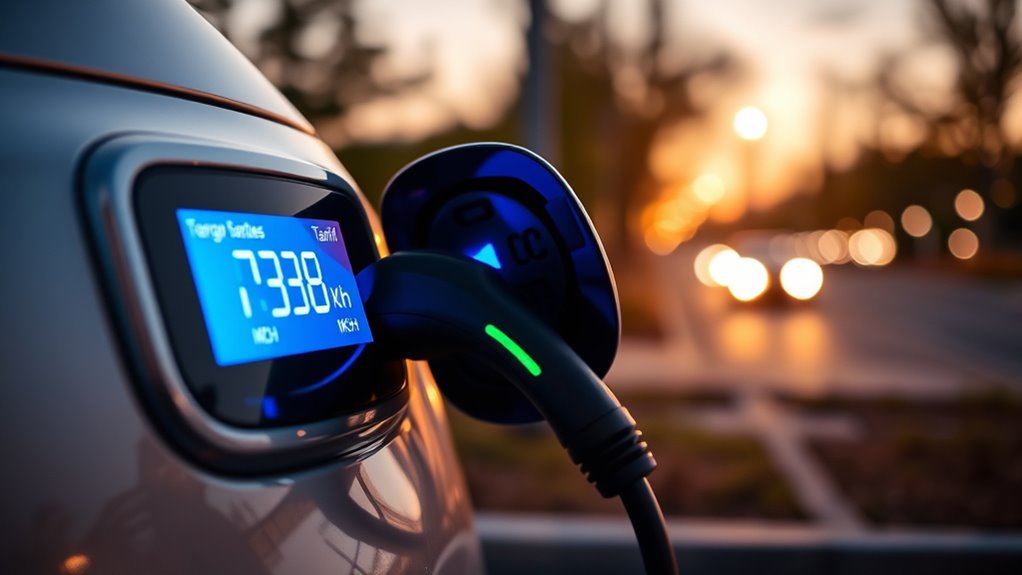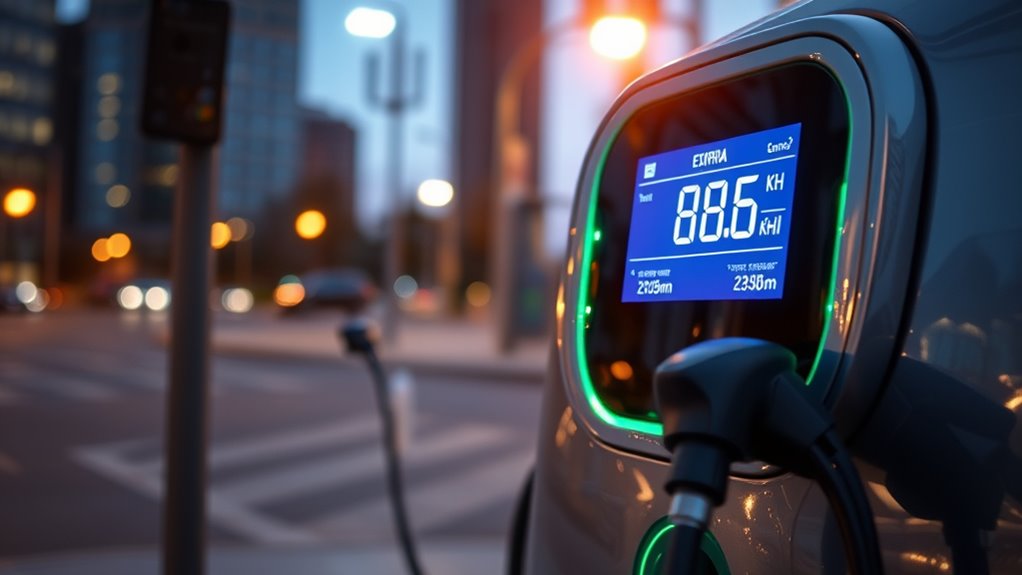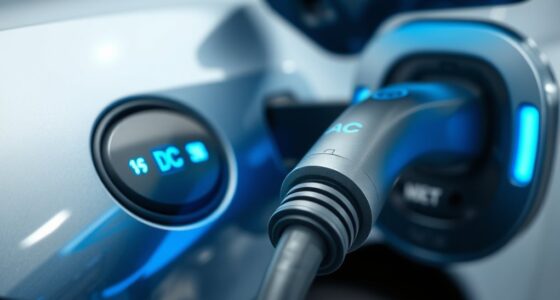To estimate your charging costs, start by finding your electricity tariff per kilowatt-hour (kWh), which varies based on location, time, and station type. Know your vehicle’s battery capacity to determine how much energy you’ll need. Multiply the capacity (e.g., 60 kWh) by the rate per kWh for an approximate cost. Keep in mind that tariffs and charging habits impact expenses, and understanding these details helps you budget better—more insights are just a step away.
Key Takeaways
- Determine your vehicle’s battery capacity in kilowatt-hours (kWh) for accurate cost estimates.
- Check your electricity provider’s current per-kWh rates, including any time-of-use or tiered pricing.
- Calculate charging costs by multiplying battery capacity by the applicable per-kWh rate.
- Account for additional fees at public stations, such as fast-charging premiums or session charges.
- Consider charging during off-peak hours to reduce costs, especially for incremental top-offs.

Ever wondered how much it really costs to charge your electric vehicle? Understanding the true expenses behind charging can help you budget better and avoid surprises at the pump—or rather, at the charging station. The key lies in grasping how electricity is priced, especially when measured in kilowatt-hours (kWh), and how different tariffs can impact your overall costs.
When you plug in your EV, you’re essentially buying energy measured in kWh, so knowing the price per kWh is fundamental. This rate varies depending on your location, the time of day, and the type of charging station you use.
Most residential electricity providers bill you based on a per-kWh rate, which can fluctuate depending on your usage tier or time-of-use plans. For example, during peak hours, the rate might be higher, encouraging you to charge your vehicle overnight or during off-peak times to save money.
Public charging stations, on the other hand, often have different tariffs—some charge a flat fee per session, while others bill by the kWh. Fast chargers, which can rapidly top off your battery, tend to be more costly per kWh than standard chargers because of the convenience they provide.
To estimate your charging costs accurately, start by checking your electricity provider’s current rates. If they offer time-of-use plans, note the off-peak rates, which are often substantially lower.
Next, look at the capacity of your vehicle’s battery in kWh—say, for example, your EV has a 60 kWh battery, and you want to fill it from empty to full. Multiply the battery capacity by the rate per kWh to get a rough estimate of the cost.
So, if your rate is $0.13 per kWh, filling a 60 kWh battery would cost around $7.80.
Remember, not every charging session will fill your battery from empty; most people top off incrementally. So, if you only need to add 20 kWh during a session, your cost will be proportionally lower.
Tariffs also come into play here—some providers might charge an additional fee for using public stations or fast chargers, which can increase your per-kWh cost. Always check the specific tariff details before plugging in, so you know what to expect.
Additionally, battery capacity varies among electric vehicles, so understanding your specific model’s size helps you estimate costs more precisely.
Frequently Asked Questions
How Do Time-Of-Use Tariffs Affect Charging Costs?
Time-of-use tariffs can considerably affect your charging costs by varying prices based on the time of day.
When you charge during off-peak hours, you usually pay less, saving money.
Conversely, charging during peak times can be more expensive.
Are There Discounts for Off-Peak Charging Sessions?
Yes, you can often find discounts for off-peak charging sessions, which are like hidden treasures waiting to be uncovered. Utilities and charging networks frequently offer lower rates during these times, helping you save money.
How Accurate Are Online Cost Calculators for My Location?
Online cost calculators for your location can be quite accurate, but their precision depends on the data they use. If they pull real-time tariff rates and charging station info, you’ll get a good estimate.
However, factors like local rate changes, station-specific fees, and your actual energy consumption can affect accuracy.
Always double-check with your utility or charging station provider for the most precise cost estimates.
Do Charging Costs Vary Between Public and Home Chargers?
Yes, charging costs can vary between public and home chargers. Public chargers often charge higher rates due to convenience and infrastructure costs, sometimes including connection fees or session-based charges.
Home charging tends to be cheaper, especially if you have a good electricity plan.
Keep in mind, public chargers may also have dynamic pricing, so costs fluctuate based on demand or time of day.
Always check the specific rates to plan your charging budget.
What Factors Influence Fluctuations in Electricity Prices?
You’ll notice electricity prices fluctuate due to factors like supply and demand, weather, and fuel costs. When demand spikes or renewable outputs drop, prices tend to rise.
Seasonal changes, such as colder months, also impact costs. Additionally, regional policies, infrastructure upgrades, and market competition can influence prices.
Staying aware of these variations helps you better estimate your charging expenses and choose best times to top up your EV.
Conclusion
Now that you know how to estimate your charging costs by kWh and tariffs, imagine the savings waiting to be accessed. Will you choose a higher or lower tariff? Could strategic charging times make a difference? The power’s in your hands—every decision shapes your expenses. Stay tuned, because understanding these details might just change how you approach your electric vehicle’s charging routine forever. Are you ready to take control and maximize your savings?









